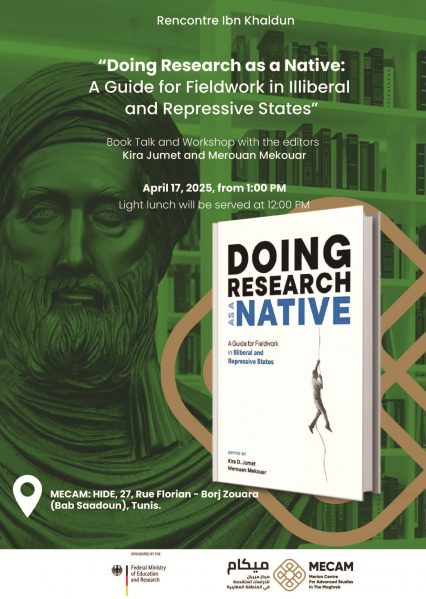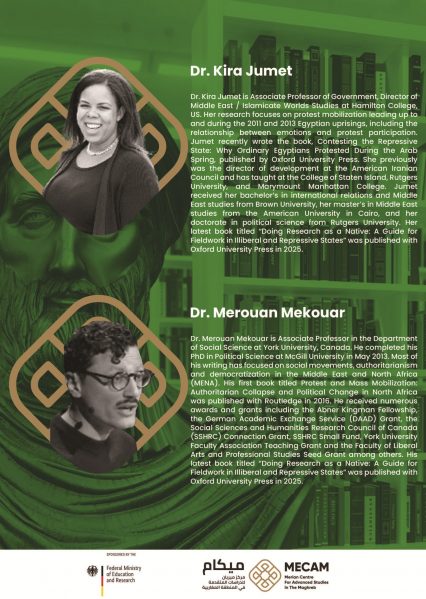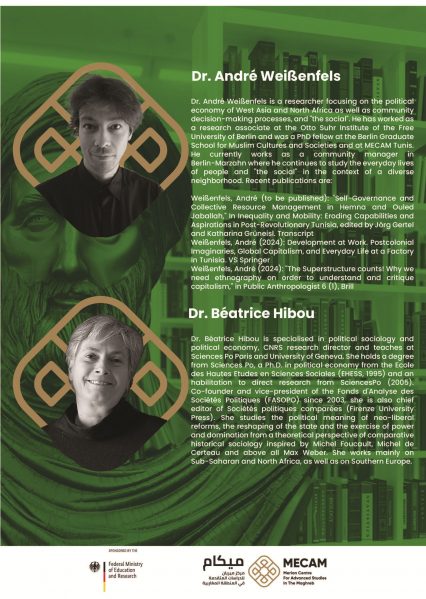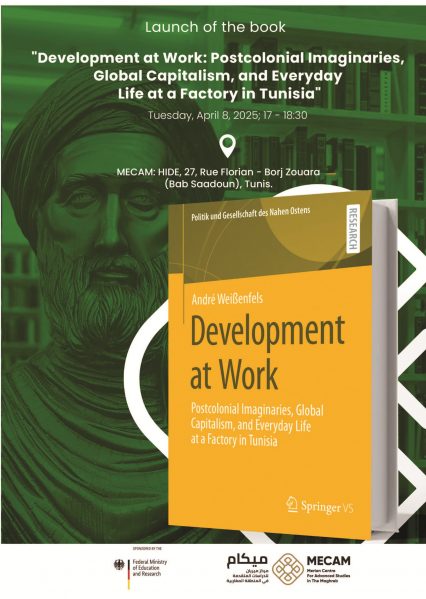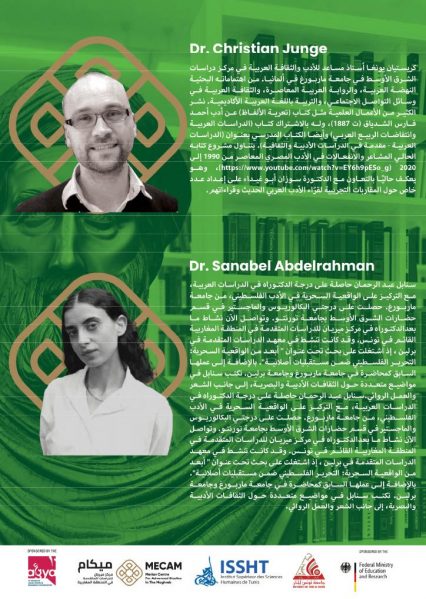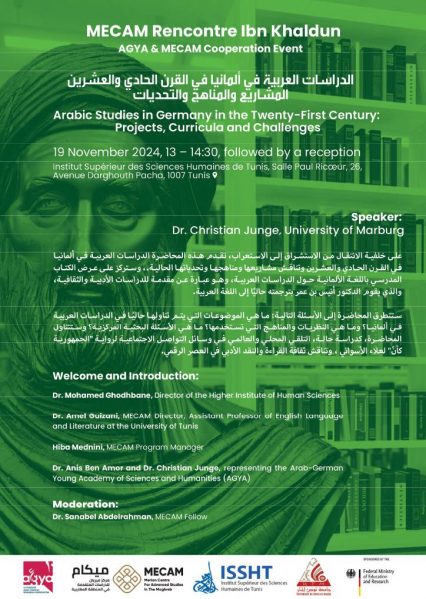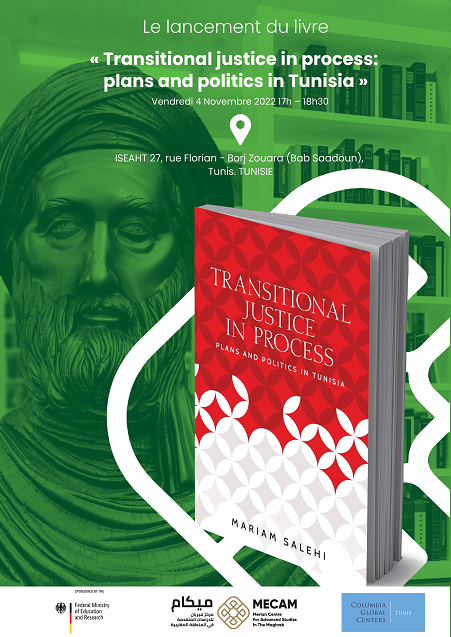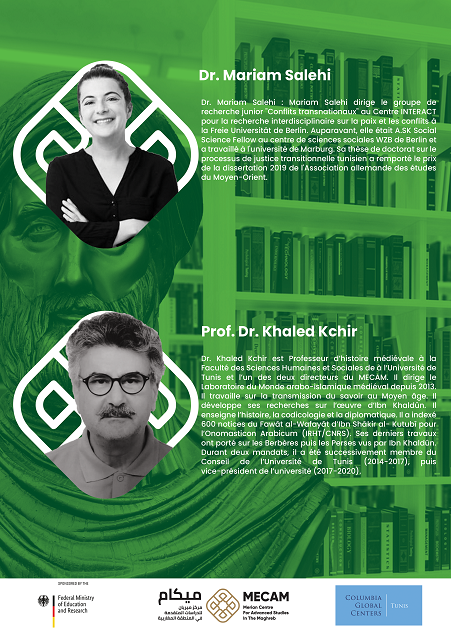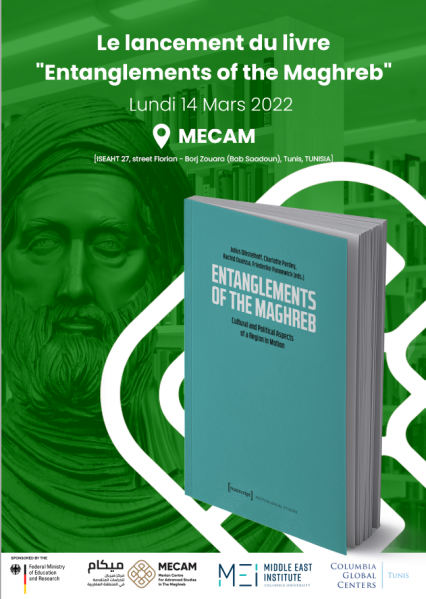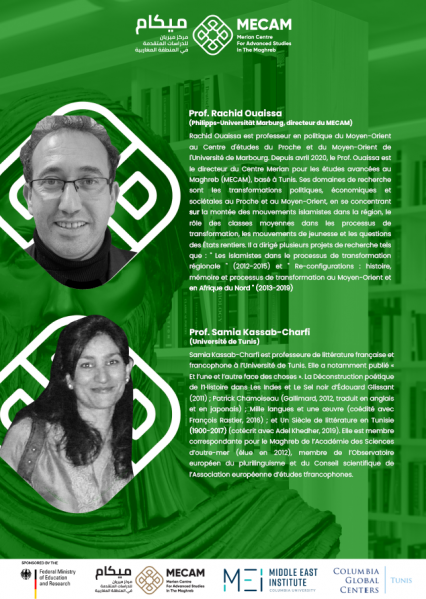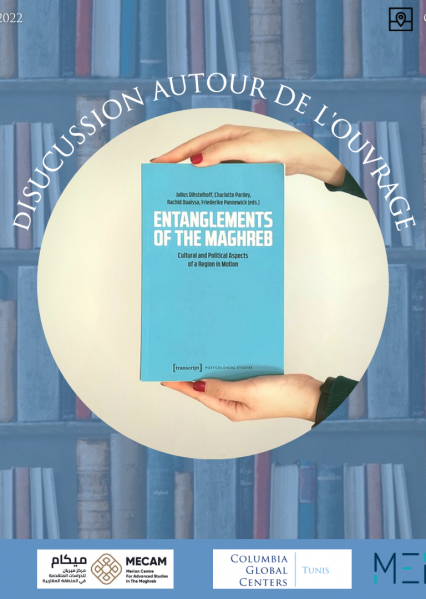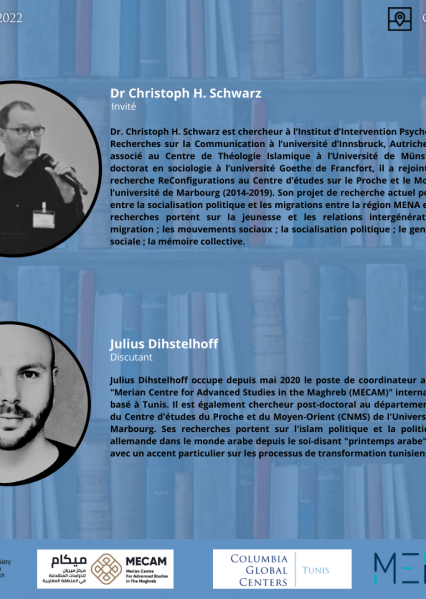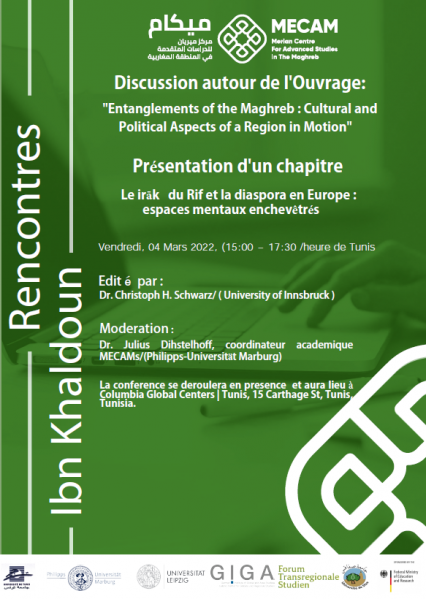2nd MECAM Policy Talk in Berlin
On 27 June 2025, the annual MECAM Policy Talk will be held in Berlin, Germany, as part of a series of side events. These events aim to engage policymakers, support informed political decision-making, and enhance MECAM’s visibility within Berlin’s political landscape, fostering sustainable cooperation.
Coordinated by the German Institute for Global and Area Studies (GIGA) and in cooperation with the German Africa Foundation (DAS), this year’s Policy Talk is planned as a discussion-focused roundtable on the topic “Security, Migration, Economy: Enhancing cooperation between Germany, the Maghreb and the Sahel amid shared challenges”. As all these countries navigate an era marked by geopolitical shifts, economic transformation, and global crises, strengthening their partnership has become more urgent than ever.
We are pleased to welcome our speakers and team members to Berlin for this occasion – an opportunity to strengthen connections within and beyond the MECAM network, while engaging with policymakers, ministry representatives, political foundations, and members of the academic community.
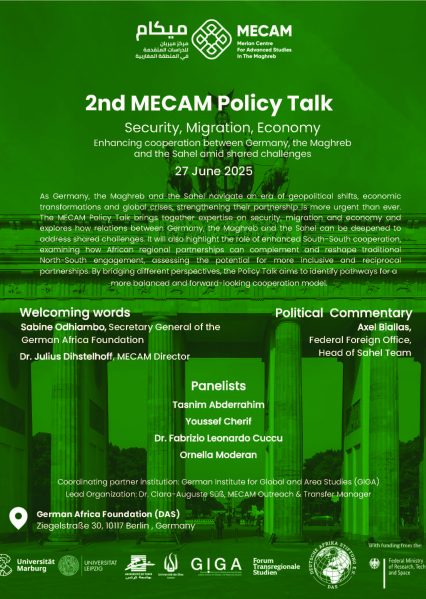
Book Talk and Workshop on “Doing Research as a Native: A Guide for Fieldwork in Illiberal and Repressive States”
– April 17, 2025 at 1PM
This Rencontre Ibn Khaldun event will explore the challenges particular to researchers conducting fieldwork in their native repressive and/or illiberal home countries. Dr. Kira Jumet (Hamilton College, US) and Dr. Merouan Mekouar (York University, Canada) will present and discuss their recently published edited volume “Doing Research as a Native” (Oxford University Press, 2025). The book talk is followed by a subsequent workshop session, designed to offer practical, hands-on advice and provide plenty of time for questions and conversation.
Abstract of the edited volume: Numerous publications have examined the challenges faced by non-native (often Western) academics conducting research in repressive countries. However, discussions of the unique security risks experienced by native scholars seem to be largely absent. While native academics face many of the challenges highlighted in existing publications, such as data security, access to informants, and personal safety, they also face additional risks and distinct obstacles, including weight of local identity markers, governmental pressure on family, legal threats from local authorities, and exploitation by non-native colleagues. Doing Research as a Native addresses this critical gap in the literature through fieldwork accounts from 19 social science and humanities researchers who conducted fieldwork in their 15 repressive and/or illiberal home countries and faced challenges directly related to their position as native scholars. The book identifies the risks and obstacles faced by these scholars and also provides practical guidance for the preparation and carrying out of fieldwork, including methodological suggestions and coping strategies.
Location: MECAM, (HIDE) 27, Rue Florian – Borj Zouara (Bab Saadoun), Tunis
Book Talk “Development at Work: Postcolonial Imaginaries, Global Capitalism, and Everyday Life at a Factory in Tunisia”
– April 8, 2025 at 5PM
This Rencontre Ibn Khaldun Event will explore the relationship between Tunisia’s political economy, the postcolonial promises of the Tunisian state, and the hopes and dreams of Tunisians working in a French factory. The discussion is based on the recently published book “Development at Work” (Springer VS, 2024, open access). After a presentation by the author Dr. André Weißenfels (Berlin), Dr. Béatrice Hibou (Paris, CNRS) will offer a commentary. Moderated by Clara-Auguste Süß, the discussion will provide plenty of time for questions and conversation.
Abstract of the book: Why did the postcolonial Tunisian state promise development? How do these promises reverberate in the hopes and dreams of Tunisians today? And how do they fit into contemporary global capitalist structures of exploitation? Starting from the everyday life at a French factory in Tunisia this book explores the relationship between the political economy of Tunisia, postcolonial promises of the Tunisian state and the hopes and dreams of Tunisians working in the factory. It argues for taking the concept of development seriously not as a desirable policy goal but as a multi-dimensional social and political fact: as the unfolding of global capitalism, as a postcolonial nation-state project, and as a personal everyday imaginary. The book employs a longue durée perspective that analyzes contemporary desires and expectations while tracing and placing them inside Tunisia’s history. It thus contributes to our understanding of state-society relations and global capitalism in Tunisia.
Location: MECAM, (HIDE) 27, Rue Florian – Borj Zouara (Bab Saadoun), Tunis
Online: Link ZOOM
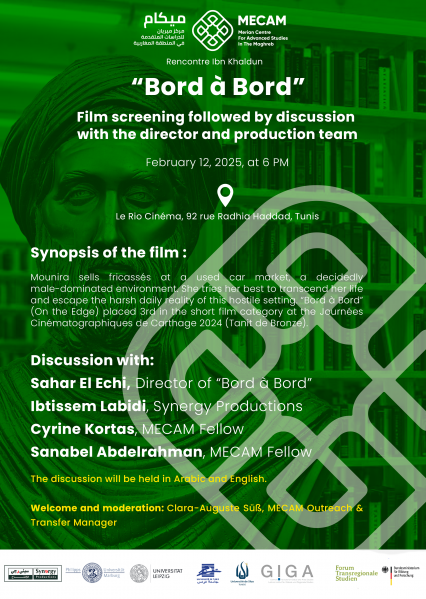
Rencontre Ibn Khaldun: Screening of the Short Film “Bord à Bord”, followed by discussion with its director – February 12, at 6 PM
Don’t miss our first Rencontre Ibn Khaldun event of the year! We are thrilled to present the short film “Bord à Bord”, followed by a discussion with its director, Sahar El Echi, along with Ibtissem Labidi from Synergy Productions, and MECAM Fellows Cyrine Kortas and Sanabel Abdelrahman. The discussion will be held in Arabic and English.
Synopsis of the film: Mounira sells fricassés at a used car market, a decidedly male-dominated environment. She tries her best to transcend her life and escape the harsh daily reality of this hostile setting. “Bord à Bord” (On the Edge) placed 3rd in the short film category at the Journées Cinématographiques de Carthage 2024 (Tanit de Bronze).
Location: Le Rio Cinéma, 92 rue Radhia Haddad, Tunis.
MECAM Policy Talk in Berlin
On 29 November 2024, the MECAM Policy Talk will be held for the first time in Berlin, Germany, as part of a series of side events. These events aim to engage policymakers, support informed political decision-making, and enhance MECAM’s visibility within Berlin’s political landscape, fostering sustainable cooperation.
Coordinated by the German Institute for Global and Area Studies (GIGA), the Policy Talk is planned as a lunchtime discussion on the topic “Solar, Hydrogen, Wind: German-Maghreb Partnership and the European Green Deal” at the Deutsche Parlamentarische Gesellschaft in Berlin. This non-partisan association of members of the German Bundestag, German state parliaments, and the European Parliament is dedicated to promoting open dialogue. Three distinguished experts – Sabrine Emran, Hichem Mansour and Mohamed Sabry – will provide insights to kick off the discussion, moderated by the Chair of MECAM’s International Advisory Board, Isabelle Werenfels.
The side events include exchange sessions at the Forum Transregionale Studien and the German Institute for International and Security Affairs (SWP), as well as a discussion at the Federal Foreign Office.
We are pleased to welcome our speakers and team members to Berlin for this occasion, strengthening ties within and beyond the MECAM network while engaging with policymakers, ministry representatives, political foundations, and scholars.
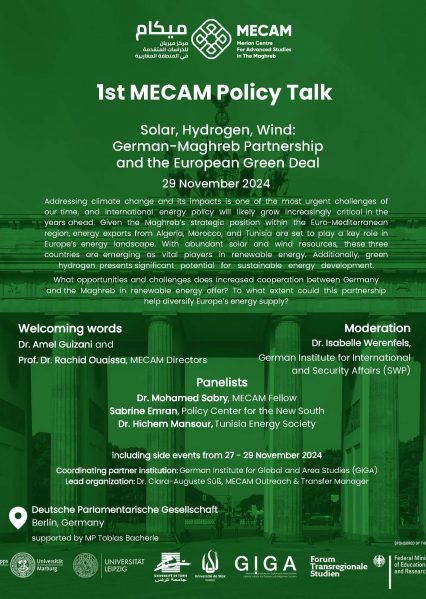
Rencontre Ibn Khaldun: “Arabic Studies in Germany in the Twenty-First Century: Projects, Curricula and Challenges”
The Merian Center for Advanced Studies in the Maghreb (MECAM) is jointly organizing a Rencontre Ibn Khaldun with Arab-German Young Academy (AGYA). In the context of the shift from Orientalism to Arabism, Dr. Christian Junge’s lecture examines the evolution of Arabic studies in Germany in the 21st century, highlighting key projects, methodologies, and challenges. The event also showcases a German-language textbook on Arabic studies, currently being translated into Arabic by Dr. Anis Ben Amor. Moderated by MECAM fellow Dr. Sanabel Abdelrahman, the Rencontre Ibn Khaldun addresses the following questions: What topics are currently being addressed in Arabic studies in Germany? What theories and approaches do they use? What are the central research questions? As a case study, the event explores the local and global social media reception of Alaa Al Aswany’s novel “Jumhuriyat ka’an”. It discusses the culture of reading and literary criticism in the digital age.
Please note that the event will be held in Arabic
Date : 19 Novembre 2024 (1pm – 2:30pm)
Location : Institut Supérieur des Sciences Humaines de Tunis (Salle Paul Ricœur)
Rencontre Ibn Khaldoun : Série de conférences « Perspectives sur la Méditerranée », 5 au 7 novembre 2024
As part of the International Conference “A Decolonial Mediterranean? Disparities, Imaginations, Power Relations,” held from November 5–7 in Tunis, MECAM is delighted to announce a series of keynotes by three distinguished scholars. The Rencontre Ibn Khaldun, titled “Perspectives on the Mediterranean,” will feature diverse approaches, viewpoints, and ample time for discussion. In three keynotes, speakers will explore the potential for decolonizing (writings about) cities, solidarity and revolutionary movements across the Mediterranean and Black Sea, as well as historical perspectives on (de)colonizing the French Mediterranean.
- 5 November 2024, at 3.30 PM: Mohamed Jerbi, Sfax
Décolonisation des villes et des écrits sur les villes en Méditerranée méridionale : Comment intégrer le passé impensé / oublié ?
Moderated by Riadh Ben Khalifa - 6 November 2024, at 4 PM: Rim Naguib, Berlin
Solidarity against Empire: Revolutionary Paths and Ties across the Mediterranean and Black Sea
Moderated by Esther Möller - 7 November 2024, at 3.15 PM: Manuel Borutta, Konstanz
(De)colonizing the French Mediterranean: Algeria, Corsica and Occitania, 1768-1976
Moderated by Rachid Ouaissa
Welcoming words by Clara-Auguste Süß (MECAM Outreach & Transfer Manager)
Location: This event will take place on the 3rd floor of the Carlton Hotel in Tunis *Salle Tulipes* (Address: 31 Av. Habib Bourguiba, Tunis 1000) and not at the National Library.
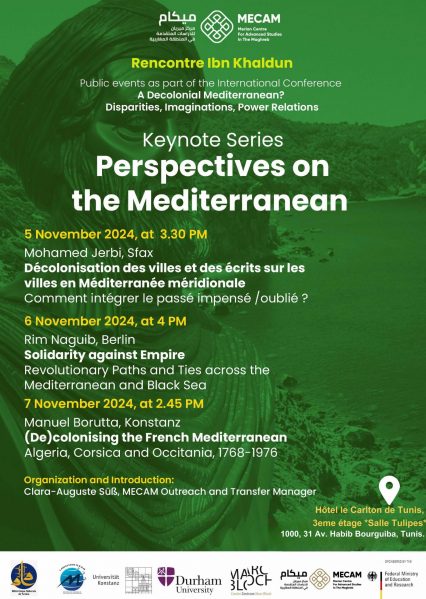
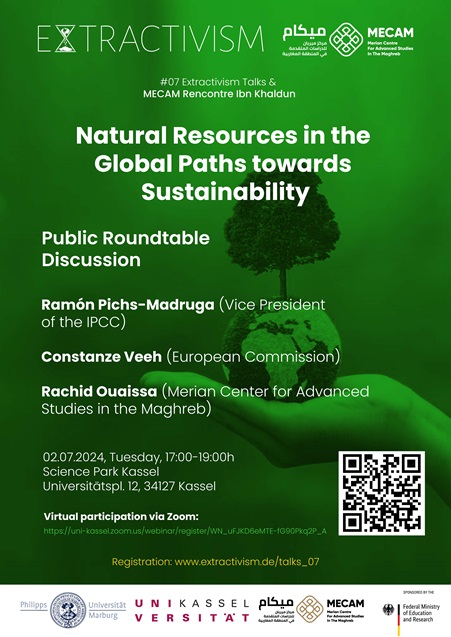
Extractivism Talks #07 / MECAM Rencontre Ibn Khaldun
As part of the Annual Conference “Comparing Extractivist Regimes: Natural Resources in the Global Paths Towards Sustainability” organized by Extractivism.de, MECAM co-hosts a roundtable discussion as part of the Rencontre Ibn Khaldun series.
The roundtable is entitled “Natural Resources in the Global Path of Sustainability”
Tuesday, July 2nd, 16h-18h (Tunis time)
Panelists:
- Ramón Pichs-Madruga, Director at the Centre for World Economy Studies (CIEM) in Cuba and Vice-Chair of the Intergovernmental Panel on Climate Change (IPCC)
- Constanze Veeh, European Commission’s Directorate General for Internal Market, Industry, Entrepreneurship and SMEs
- Rachid Ouaissa, Philipps-University of Marburg, Director of MECAM
Participation via Zoom Webinar: click here
Branding the Middle East and North Africa (Book Presentation)
The edited volume presented at this Rencontre Ibn Khaldoun of MECAM investigates place, product, and personal branding in the Middle East and North Africa, including some studies from adjacent regions and the wider Islamicate world. Going beyond simply presenting logos and slogans, it critically analyses processes of strategic communication and image building under general conditions of globalisation, neoliberalisation, and postmodernisation and, in a regional perspective, of lasting authoritarian rule and increased endeavours for “worlding.” In particular, it looks at the multiple actors involved in branding activities, their interests and motives, and investigates tools, channels, and forms of branding beyond the ubiquitous logos and slogans. A major interest exists in the entanglements of different spatial scales and in the (in)consistencies of communication measures. Attention is paid to reconfigurations of certain images over time and to the positioning of objects of branding in time and space. Historical case studies supplement the focus on contemporary branding efforts. While branding in the Western world and many emerging economies has been meticulously analysed, this edited volume fills an important gap in the research on MENA countries.
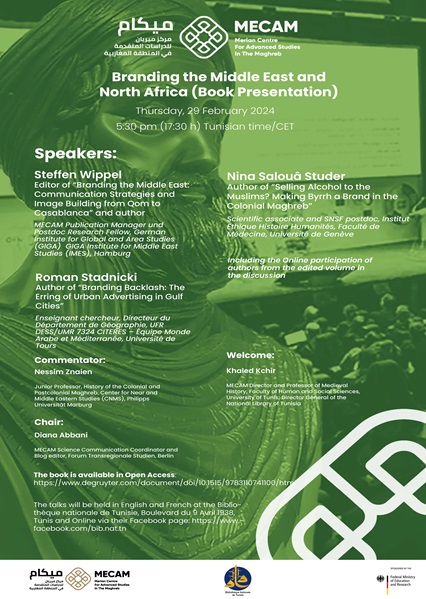

History of the Maghreb since independence
Over the last sixty years, the Maghreb has witnessed major events that have profoundly altered its structures, institutional frameworks and societies. More than half a century of history is presented here, from independence to the period following the Arab Spring, offering a political, cultural, economic and societal panorama to highlight the permanent changes, developments and revolutions that have marked the Maghreb in recent decades. The authors have opted for an unprecedented, global, cross-cutting approach to the three countries of the central Maghreb (Algeria, Morocco and Tunisia), in order to gain a better understanding of their recent history and current situation. They present complex and dynamic societies, with their heritages and constantly renewed challenges: the rise of civil society, religious extremism, the capture of economic resources, reflection on the principle of democracy, the place of women, the migratory crisis, etc. All these issues are presented, analysed and discussed thanks to the contribution of recent work by social science specialists, in order to offer relevant keys to understanding a geographical area and its recent history. This first comprehensive work on the history of the Maghreb since independence helps us to understand the driving forces and dynamics of the states and societies common to these three countries.
Karima Dirèche is a qualified history teacher and Director of Research at CNRS/TELEMMe. Her work focuses on the history of contemporary Maghrebian societies in their cultural, religious and migratory dimensions. Her research explores the question of religious minorities in the Maghreb (Catholics, Jews and neo-evangelicals today) and their political and religious controversies; the Berber dimension in its relationship with politics since independence; and national historical narratives in the light of Islamist and Berberist movements.
Nessim Znaien is a Junior-Professor at the University of Marburg (Germany) and holds a PhD in Contemporary History from the University of Paris 1 Panthéon-Sorbonne in 2017. A former long-term fellow at the Institut de recherche sur le Maghreb contemporain (IRMC) and former temporary teaching and research associate at the University of Aix-Marseille from 2017 to 2020, he is the author of “Raisins de la domination. Une histoire sociale de l’alcool en Tunisie sous le Protectorat” (2021) and a “histoire du Maghreb depuis les indépendances” (2023).
Moderator: Isabelle Werenfels is a Senior Fellow at the German Institute for International and Security Affairs, where she also headed the Africa and Middle East Group for five years. She has published numerous works in German, English and French on the development of the Maghreb and Euro-Maghreb relations. She is currently President of MECAM’s International Scientific Council
The Electoral Politics of Erdoğanism
The event will discuss the dynamics of electoral politics in Turkey in May 2023. Drawing on the results of the parliamentary elections and the first round of the presidential elections (14th May), Roy Karadag (University of Bremen) and Hakkı Taş (GIGA Hamburg) will present their ideas on specificities of Turkey’s competitive authoritarianism. They will debate the role of institutional advantages for ruling elites in electoral settings and the strategies of contesting these advantages by opposition parties and activists. Finally, they will highlight what these results mean for Turkey’s place in contemporary MENA politics.
Hakkı Taş is Research Fellow at GIGA German Institute of Global and Area Studies, Hamburg. His research interests include populism, diasporas, political Islam, and identity politics, with a special focus on Turkey and Egypt. In 2011, he received his PhD in Political Science at Bilkent University. Before his appointment at GIGA, he held researcher or teaching positions at Yale University, American University in Cairo, Ipek University in Ankara, the Swedish Defence University, and the University of Bremen.
Roy Karadag is research fellow at the Institute of Intercultural and International Studies (InIIS) at the University of Bremen. Before joining InIIS in 2011, he was doctoral student and Post-Doc at the Max Planck Institute for the Study of Societies in Cologne. His research includes Turkish and MENA politics, the history of welfare states and social policy in Africa. He is currently head of the research group „Social Policy and Rural Development“ at the Collaborative Research Cetre 1342 „Global Dynamics of Social Policy“.
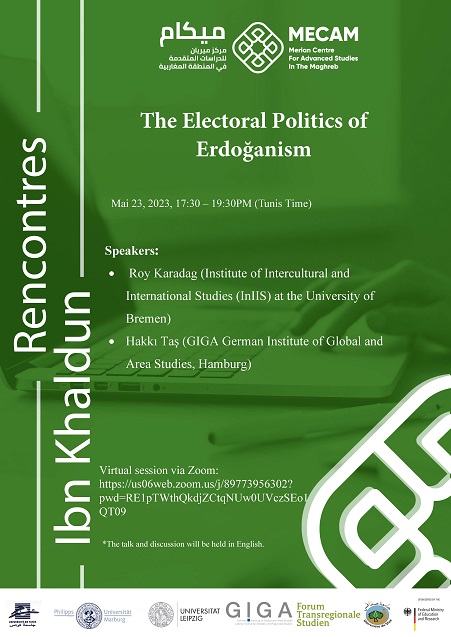
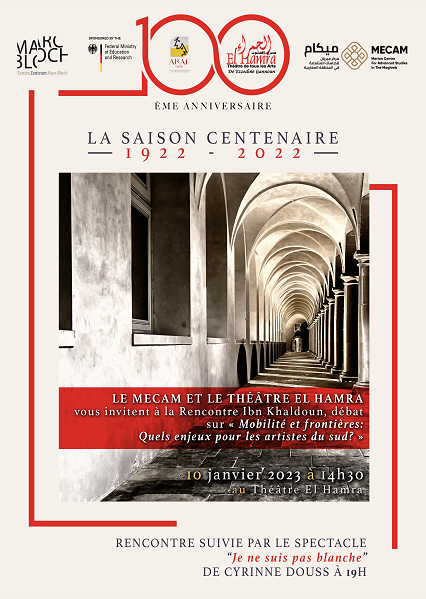
Mobility and borders: What issues for artists from the South?
This meeting aims to create a platform for exchange between the scientific community and the actors of the cultural, political and civil society.
Questioning the issues of circulation of Tunisian artists and more broadly artists from Arabic-speaking countries is at the heart of this discussion proposed by MECAM, in collaboration with the El Hamra Theatre. The mobility of artists is at the heart of artistic practice, training and creation processes. However, the persistent inequalities in access to these circulations impact the Tunisian cultural environment. These inequalities, reinforced in the post-COVID 19 context, materialize in particular in the difficulties of access to visas, in the increase in travel costs to the detriment of artists from the South. But these issues of disparity are also noticeable in artistic and aesthetic expectations. Funding and programming opportunities on international stages are often limited to perceptions centered on identities and socio-political contexts as they are perceived externally. How do artists and arts and cultural institutions develop their practice in cooperation and resistance to these issues? This question and these issues will be discussed by three speakers: Cyrinne Douss, Cyrine Gannoun and Ophélie Mercier and moderated by Vanessa Barisch. An exchange with the public will then be organized to expand the debate.
The Tunisian-French choreographer and dancer Cyrinne Douss will participate in the debate by talking about her career, her personal position and her artistic approach. As a bi-national, she will share her views and experiences on identity issues on both sides of the Mediterranean and will allow us to discuss the notion of “out-group”.
At the end of the discussion, Cyrinne Douss will present her performance “I am not white – بيضاء مانيش” as a possible extension of the debate.
In this Ibn Khaldoun Meeting, we aim to discuss the different points of view on the theme on two levels: First, the influence of the themes of (de-)colonization, mobility, borders and identity attributions on artistic work in particular performative art; second, the impact of macrostructures such as border regimes, funding, stereotypes towards a difference in the quality of artistic training in the North and the Global South in an environment affected by colonial structures.
“JE NE SUIS PAS BLANCHE | بيضاء مانيش” is a multidisciplinary creation that circulates between song, dance, text and performance. How do we identify our impasses? How to face our intimate and collective shadow zones? To answer this question, Cyrinne Douss, alone on stage, engages in a process of metamorphosis and resistance. Between power and vulnerability, she invites us to move, to better embrace our shared realities.
Book lauch « Transitional justice in process: plans and politics in Tunisia »
Book launch co-organized by the Merian Centre for Advanced Studies in the Maghreb (MECAM) and Columbia Global Centers | Tunis: « Transitional justice in process: plans and politics in Tunisia » by Dr. Mariam Salehi is the first book to comprehensively study the Tunisian transitional justice process. After the fall of the Ben Ali regime in 2011, Tunisia swiftly began dealing with its authoritarian past and initiated a comprehensive transitional justice process, with the Truth and Dignity Commission as its central institution. However, instead of bringing about peace and justice, transitional justice soon became an arena of contention. Through a process lens, the book explores why and how the transitional justice process evolved, and explains how it relates to the country’s political transition. The book will be discussed by Dr. Khaled Kchir.
Dr. Mariam Salehi is invited from Germany for a week at MECAM in Tunis as a visiting scholar.
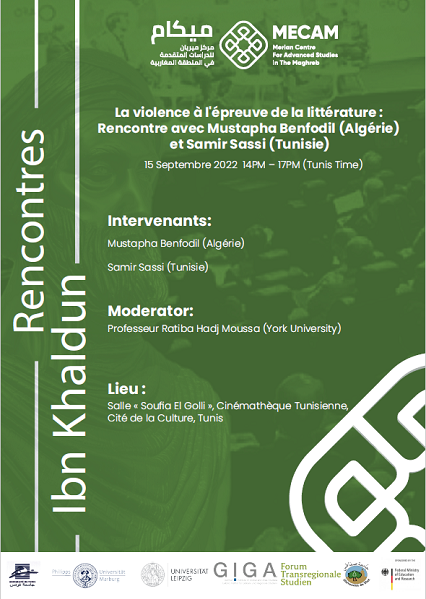
La violence à l’épreuve de la littérature : Rencontre avec Mustapha Benfodil (Algérie) et Samir Sassi (Tunisie)
Legacies of violence leave visible and invisible traces on societies, prompting questions about their political trajectories, their effects, the sense of justice and peace, and associated creative expressions. Literature is one of the privileged domains that explores these questions. Whether fiction or non-fiction, literature addressing violence is a powerful means of expression which can reflect and link individual and shared experiences, influence and be influenced by public debates, as well as contribute to an evolving understanding of the role of public and cultural memory in dealing with the legacy of violence.
Both Algeria and Tunisia deal with legacies of violence. The literary work in Algeria and Tunisia forms part of a continued negotiation, elaboration, identification and recognition in dealing with past violence that flows over into the present in the two countries.
During this Rencontre Ibn Khaldoun, Professor Ratiba Hadj-Moussa will discuss with Algerian writer Mustapha Benfodil and Tunisian writer Samir Sassi their works and their treatment of the civil war (Algeria) and authoritarian violence (Tunisia), the impacts of the those on their personal and artistic experiences, as well as the relationships of their works with public debates in their respective countries or more broadly.
Benzine: Film screening followed by discussion with the director
*Synopsis*
Salem and Halima are looking for their only son who disappeared a few months ago. The latter chose to emigrate illegally to Italy a few days after January 14, 2011. The couple leads a relentless and desperate search that disrupts their lives. The film takes place in the South, an arid and austere landscape, a deep Tunisia where smuggling and socio-political tension are mixed.
* Sarra Abidi (Independent Filmmaker)*
Sarra Abidi, Tunisian filmmaker born on October 14, 1972 in Gabes, Tunisia, she studied at the Institut supérieur des Beaux Arts and then at the INSAS in Belgium. She also studied documentary film in Montreal and production at the INA-Paris. She has directed two short films, Le rendez- vous (2006) and Le dernier wagon (2010), and 111 Rue de la poste, a 52 min documentary (2011). Her first feature film BENZINE was released in 2018. Selected in several festivals, FIFF Namur, Dubai Film Festival, Cologne film festival, Aubagne film festival and other festivals, it received TV5 monde award, Best female performance award, Best male performance award, and Best film award. She has just finished her feature documentary BAKHARA/SULFUR, and is preparing her second feature film, Je m’appelle Clara


Anne-Marie McManus, Amir Moosavi « Approaching the Literary 1980s in the Maghreb and Middle East: Connections, Comparisons, Periodizations »
»Transregionalism and Arabic Novels: On Literary Uses of History in the 1980s« (Anne-Marie McManus)This talk approaches the 1980s through a comparative frame for the Arabic novel, which it treats as transregional in two senses: on one hand, a literary work that imagines, or maps, transregional (“Arab”) space between the Maghreb and Iraq, and on the other hand, a literary work that can successfully circulate and be received across this space. Through readings of novels by Haydar Haydar and Rachid Boudjedra, the talk will show that transregional space was intimately entangled with the dream of a progressive, revolutionary, and transregional history as it was articulated first in the anti-colonial era and subsequently claimed by Arab socialist states in Algeria, Iraq, and Syria. By drawing a comparison across techniques of repetition in works by Haydar and Boudjedra, the talk asks what work remained for the novel as form when it critically reflected, in the 1980s, on the demise of this vision of history.
Anne-Marie McManus is a comparative literary scholar of Arabic, English, and French literatures in the 20th and 21st century. She received her PhD in Comparative Literature from Yale University. She has published essays on poetics, comparative and theoretical methods, and contemporary Arabic literatures and cultures in venues such as Critical Inquiry (2021), The Cambridge History of World Literature, Books & Ideas, International Journal of Middle East Studies, Journal of World Literature, and Expressions Maghrébines. Her first book – Of Other Languages, under contract at Northwestern UP – tracks theories and practices of linguistic clarity, ambiguity, and emotion that circled the Algerian War of Independence during the decades of decolonization between the Maghreb and Mashreq. Her work has been supported by the Mellon Foundation, the Alexander von Humboldt Foundation, NYU Abu Dhabi, and the European Research Council (ERC). She currently oversees the ERC-funded project SYRASP at the Forum Transregionale Studien in Berlin.
»War and Relation: Reading the 1980s across the War Literatures of Iran and Lebanon» (Amir Moosavi)This talk proposes a comparative framework for reading Arabic and Persian literatures of the 1980s in the context of war. Using examples from Iran, Iraq, and Lebanon, and informed by theories of world literature and Shu-mei Shih’s notion of relational comparison, it asks how war fiction from Southwest Asia in the 1980s can be used to periodize a regional literature. In doing so, it offers a comparative reading of Arabic and Persian literatures against the backdrop of the final years of the Cold War, regional wars, the rise of political Islam and the decline of leftist political movements across the region.
Amir Moosavi’s research and teaching interests cover modern Arabic and Persian literatures and the cultural history of Southwest Asia, with an emphasis on Iran, Iraq, and the Levant. With ACLS and NEH support, he is currently completing a book titled Dust That Never Settled: Afterlives of the Iran-Iraq War in Arabic and Persian Literatures. The book argues for the expansion of comparative literary studies across the Arabic and Persian linguistic spheres based on the common experience of the Iran-Iraq war and the various responses of writers to it since 1980.
This event is a cooperation between the Merian Centre for Advanced Studies in the Maghreb (MECAM) and Europe in the Middle East – The Middle East in Europe (EUME). It is part of the workshop “The Literary 1980s in the Middle East and North Africa: Towards a Transregional History of the Present”, June 29 to July 1, 2022, Berlin.
La question du multilinguisme au Maghreb: représentations de la langue et postures d’appropriation
Co-organized by the Merian Centre for Advanced Studies in the Maghreb (MECAM) and Columbia Global Centers | Tunis and in partnership with the Columbia Middle East Institute (MEI) and the Federal Ministry of Education and Research (Germany), this event will be dedicated to the launch of “Entanglements of the Maghreb: Cultural and Political Aspects of a Region in Motion” which is a new book published in January 2022 and edited by Julius Dihstelhoff, Charlotte Pardey, Rachid Ouaissa, and Friederike Pannewick but also to discuss one of its chapters written by Prof. Samia Kassab-Charfi. Samia Kassab-Charfi, professor of French and Francophone literature at the University of Tunis.
Book Summary: The impetus for recent transformations in the Arab world has come from the Maghreb. Since then, research on the region has multiplied, but much remains to be done in terms of interdisciplinary comparative research. The Maghreb is a heterogeneous region that deserves a thorough investigation. This volume focuses on entanglement as an interdisciplinary and cross-linguistic concept in order to generate a new approach to the region, its internal interdependencies, and its exchanges with other regions. Leading scholars conceptualize Entanglements through the description of various thematic fields and actors in motion, addressing culture, politics, social affairs and economics.
Chapter Summary: In “The Question of Multilingualism in the Maghreb: Representations of Language and Postures of Appropriation,” Samia Kassab-Charfi examines multilingualism in the Maghreb using the example of the empirical study of Francophone – primarily Tunisian – literature during the 20th century. She is interested in cultural entanglements in the form of cross-linguistic dynamics, such as linguistic representations, relations between languages, attitudes of appropriation and their respective imprints on identity.
Prof. Dr. Rachid Ouaissa, professor of Middle Eastern Politics at the Centre for Near and Middle Eastern Studies, Philipps-University Marburg and MECAM director, will moderate the event.
Discussion about the book: Entanglements of the Maghreb
As part of the presentation of the anthology “Entanglements of the Maghreb” Dr. Christoph Schwarz will present ” Le ḥirāk du Rif et la diaspora en Europe: espaces mentaux enchevêtrés,” where he focuses on the activists of the Moroccan ḥirāk movement based in Europe around 2017. The author discusses the entangled positions of European activists between Europe and their home country, Morocco (specifically the Rif region). He argues that the politicization and mobilization of a Rif diaspora has produced an identification not only with the Rif but also with Europe. These are transnational practices, an example of entangled mobilities in the Maghreb.
Challenges of inclusive mobility in times of COVID-19 crisis
The COVID-19 crisis has revealed various forms of inequality in access to urban mobility and essential services. In societies where financial aid is very limited, it has become obvious that confinement is hardly a viable solution to address the sanitary implications of this crisis. The more long-standing causes of mobility restrictions in public space, however, need to be addressed beyond immediate concerns for crisis management. Accessibility is a key issue when it comes to improving mobility and tackling the consequences of spatial injustice such as unequal access to resources, facilities, and health care as well as non-adapted infrastructure and overburdened transport systems. This meeting moderated by Olfa Dardaoui (Jamaity) and Johannes Frische (MECAM/IFG II) brings together researchers including Hatem Kahloun (ISTEUB/University of Carthage) Souhir Bouzid (ISTEUB Tunis) and civil society organizations including ALDA (European Association for Local Democracy), Humanité et Inclusion Tunisie, Médecins du Monde Tunisie, Terre d’Asile Tunisie who as action-oriented public policy strategists work to improve mobility within a human rights framework. As a public event, the event is supposed to raise awareness for problems that vulnerable groups such as refugees/migrants, precarious workers and people with disabilities face on a daily basis while promoting a participatory approach that includes residents and city users, especially those particularly affected by mobility restrictions.
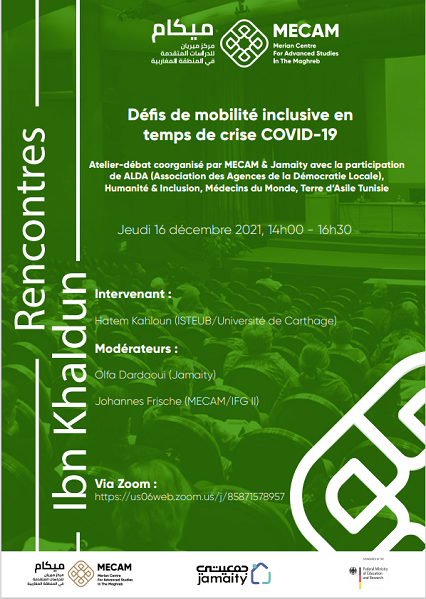
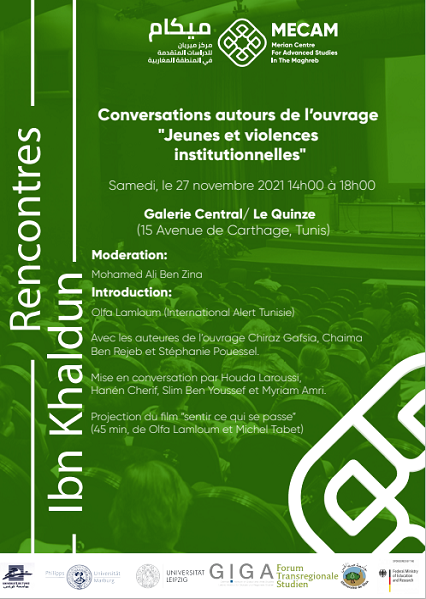
Author Meets Critics: Youth and Institutional Violence
Factors such as income inequality or unemployment, rather, other forms of institutional – and thus state-induced – violence account for the lived realities of marginalization of young inhabitants of such neighbourhoods. The edited volume “Youth and Institutional Violence” (in French: Jeunes et violences institutionnelles), published by International Alert Tunisia in spring 2021 under the lead of Ola Lamloum and Myriam Catusse, brings together cutting-edge research on different forms of institutional violence experienced and lived in the urban quarters Ettdhamen and Douer Hicher. The Rencontre Ibn Khaldoun that was organised by IFG II “inequality and mobility” on November 27th 2021 in the Gallery Le Central in Tunis brought together the book authors and MECAM fellows who took on the role of ‘critics’ to discuss the book. From exploitation in invisible female subcontracting (Chiraz Gafsia), to experiences of immobility amongst youth (Stéphanie Pouessel) and targeted police violence against ultras/football fan clubs (Chaima Ben Rejeb), new dimensions of urban marginalisation and inequality were examined.
The Berber Spring: An end to the Arab Maghreb?
For this Ibn Khaldun meeting, Karima Dirèche (CNRS/Maison Méditerranéenne des sciences de l’Homme), contributor to Entanglements of the Maghreb: Cultural and Political Aspects of a Region in Motion, will speak on “The Berber Spring: Towards the end of an Arab Maghreb? She focuses on the unprecedented Berber expressions and assertions in the 2011 Maghreb uprisings in the mirror of new demands for freedoms and the rule of law. By examining the role of Berberism, historically considered marginalized, in the collective protests and with reference to the 1960s and 1970s, Karima Dirèche examines the growing politicization and resistance of Berbers as an expression of the socio-cultural and political entanglements in the Maghreb, which have particularly reflected the ethnic and linguistic plurality of Maghreb societies since 2011. This meeting takes place on Thursday 25 November 2021, 18:00 – 20:00 (Tunis and Central European Time), via ZOOM and is moderated by prof. Rachid Ouaissa (Philipps-Universität Marburg, Director of MECAM).
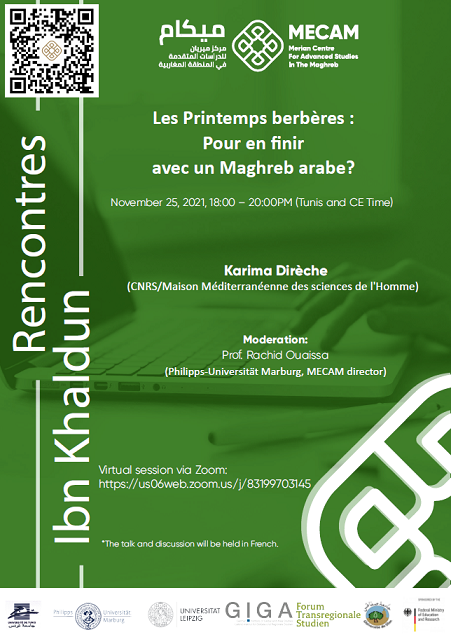
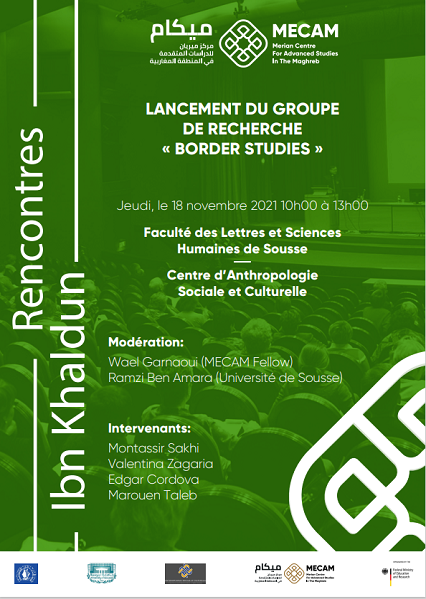
Launch of the research group “border studies”
Migration and mobility in the Mediterranean are often researched from a Eurocentric perspective, reducing countries like Tunisia to a threatening ‘origin country’ of migrants or turning it into a ‘border line’ to be secured and consolidated. By launching a new research group on “border studies”, based at the Centre for Social and Cultural Anthropology at the University of Sousse, MECAM Fellow Wael Garnaoui aims to decenter this perspective, providing more nuanced insight into the reconfigurations of borders that determine (im)mobilities in contemporary North Africa. The Rencontre Ibn Khaldoun that was organised by the IFG II “inequality and mobility” on November 18th 2021 at the University of Sousse brought together early career researchers from diverse disciplines adopting critical approaches to studying ‘borders’ in order to launch this new research group. Presentations by researchers working on borders in contexts as diverse as Tunisia, Mexico and Syria set the multi-layered research agenda: from the externalisation of borders to racialized border regimes and material cross-border circulations, frontiers are studied as sites of violence, but also as vital sites for exchange and the articulation of difference.
Urban sprawl and environmental challenges in Greater Sfax
In October 2021, Sfax – Tunisia’s second largest city – made negative headlines for an escalating waste crisis, as the long overdue closure of the city’s only dumpsite resulted in trash piling up on its roadsides and in illicit waste burning thickening the air. Teaming up with the Geography research lab SYFACTE at the University of Sfax, the IFG II “inequality and mobility”, organised a two-day long Rencontre Ibn Khaldoun on “urban sprawl and environmental challenges in Greater Sfax”. Two senior researchers of SYFACTE, Ali Bennasr and Maha Bouhlel, set out how urban development in Sfax was always closely entangled with industrial development, and how socio-economic inequalities have long mapped onto environmental injustices in the city. Research presentations by early career researchers from Sfax University then focused on different waste economies in the city, and a subsequent roundtable discussion with environmental activists from Sfax and a representative of the municipal council connected histories of pollution and environmental injustice to the on-going waste crisis in the city. The event was co-organised with the Deparment of Geography and took place over two days, on the 28th and 28th of October 2021, at the University of Sfax.
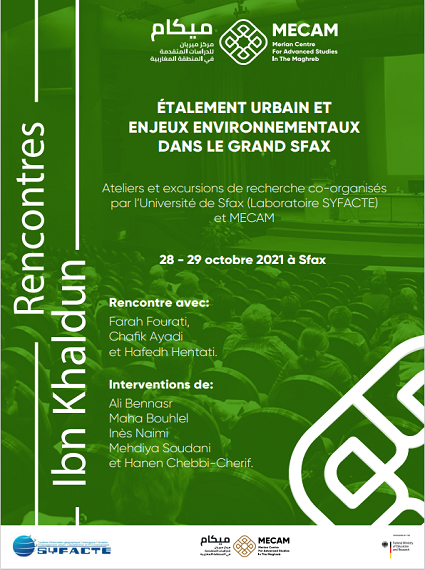
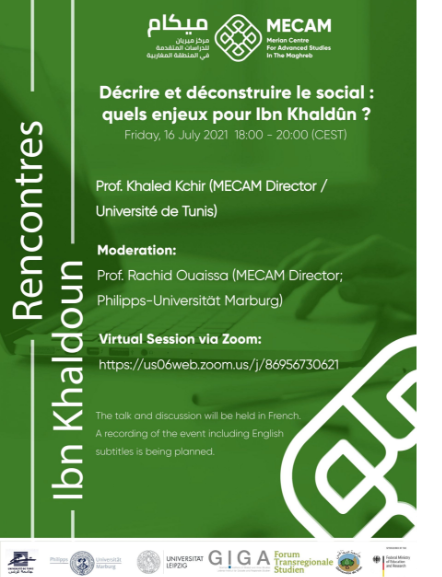
Describing and deconstructing the social: what is at stake for Ibn Khaldun?
Born in 1332 and dying in 14O6, Ibn Khaldun was an eyewitness-actor during a long and crucial transitional phase. He was a conscious and sensitive observer of human relationships and the forces that govern them. His experience was enriched by bookish knowledge but, above all, by his direct observation of all Maghrebian, Andalusian and Oriental social environments. Thus he produced a synthesis based on the history of civilisations, enriched, supported or contradicted by direct observation and observations throughout his life. The result was a state of affairs. In his approach, he started from the past, then analysed his present, trying to establish the laws governing the functioning of human societies. What did he hope to achieve through this approach of the committed historian who is fully integrated into the course of history, in theory and in practice?
The Legacy of the Arab Spring
10 years ago, a wave of protests and revolutions swept through the Arab world. It began in Tunisia in December 2010 and in the following months of 2011 swept through 17 countries in North Africa and the Middle East, from Mauritania to Oman, from Tunis to Abu Dhabi, The Legacy of the Arab Spring.
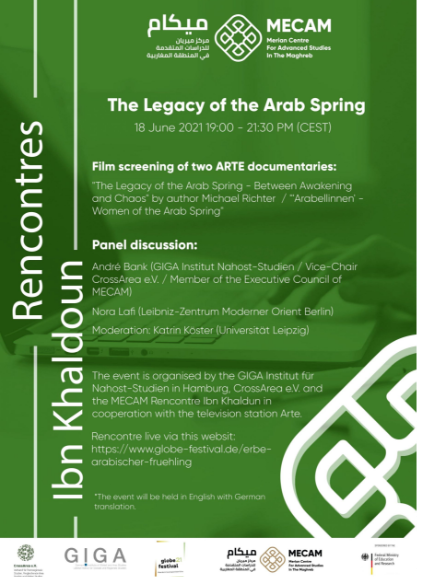
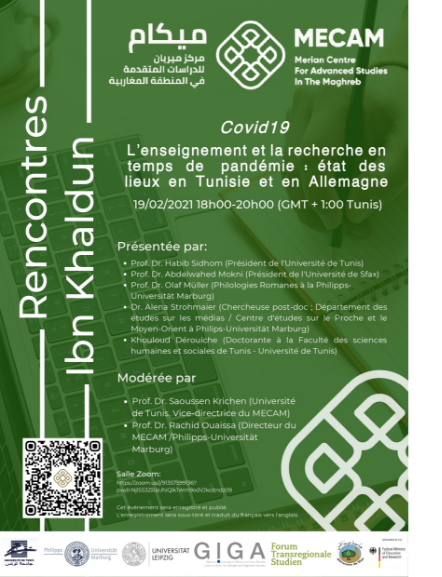
Covid19. Teaching and research in times of pandemic: state of play in Tunisia and Germany
To inaugurate the “Rencontres Ibn Khaldûn”, MECAM is organising an event in which actors directly concerned by the impact of the Covid19 pandemic on the academic world will participate. They will be invited to discuss the issues of distance learning, mobility and the challenges of research in times of health crisis. The debate will focus on specific questions such as What significance has research had in times of crisis? And what are the consequences for the research community? What measures should universities take in the short and medium term in this respect?
Report Download ![]()

